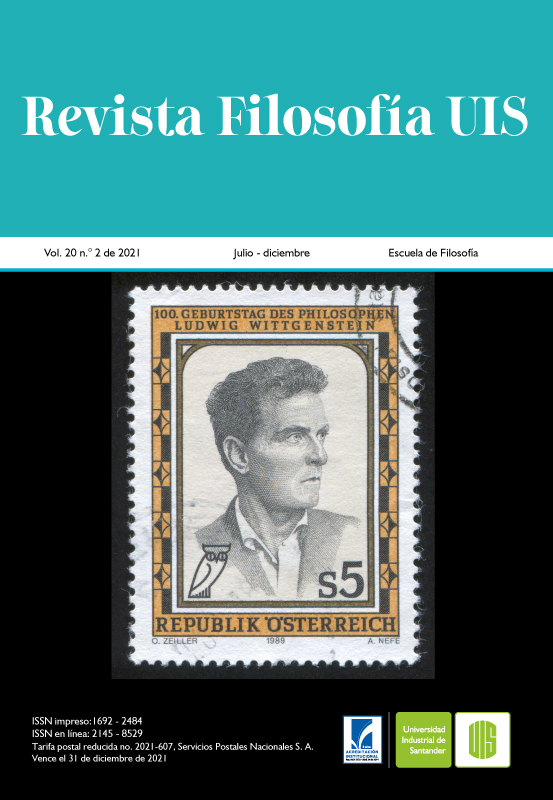Rule of Recognition and Minimum Contents of Natural Law in Hart: in Pursuit of an Articulation
Published 2021-06-11
Keywords
- conventional rule,
- validity,
- legal norm,
- legal minimums,
- constitutive convention
- legitimate authority ...More
How to Cite
Copyright (c) 2021 Revista Filosofía UIS

This work is licensed under a Creative Commons Attribution 4.0 International License.
Abstract
In this article I propose a connection between Hart’s rule of reconigtion and the thesis of minimum contents of natural law of the same author. The recognition rule is understood as a conventional rule constituted by the practice of judicial officials in charge of applying validity criteria to determine whether particular norms belong to the system. The minimum contents of natural law constitute the basis of human tendencies or instincts. in his quest for survival. From the approaches of Marmor and Raz, it is proposed that in the recognition rule the minimum contents of natural law constitute the first filter for evaluating the validity of the particular legal norms subject to legal recognition, which provides solidity and significant consistency to the thesis of discretion and separability of the Hartian theory.
Downloads
References
- Delgado Pinto, J. (1990). Sobre la vigencia y la validez de las normas jurídicas. Doxa. Cuadernos de Filosofía del Derecho, (7), 101-167. https://doi.org/10.14198/DOXA1990.7.05
- Fuller, L. (1958). Positivism and Fidelity to Law: A Reply to Professor Hart. Harvard Law Review, 71(4), 630-672.
- Hart, H. (1958). Positivism and the Separation of Law and Morals. Harvard Law Review, 71(4), 593-629.
- Hart, H. (1997). PostScriptum. En La decisión judicial: el debate Hart-Dworkin. Estudio Preliminar de César Rodríguez (89-135). Siglo del Hombre Editores.
- Hart, H. (2012). El concepto de Derecho. (G. R. Carrió, trad.). Abeledo Perrot.
- Himma, K. (2014). El Positivismo Jurídico Incluyente. Problema. Anuario de Filosofía y Teoría del Derecho, (8), 353-430. http://dx.doi.org/10.22201/iij.24487937e.2014.8.8168
- Kelsen, H. (1982). La Teoría Pura del Derecho. Universidad Autónoma de México.
- MacCormick, N. (2008). H.L.A. Hart. Stanford University Press.
- Pino, G. (2011). Farewell to the Rule of Reconigtion? Problema. Anuario de Filosofía y Teoría del Derecho, (5), 265-299. http://dx.doi.org/10.22201/iij.24487937e.2011.5.8116
- Raz, J. (1971). The Identity of Legal Systems. California Law Review, 59, 795-815.
- Rivaya, B. (2000). Teorías sobre la Teoría del Contenido Mínimo del Derecho Natural. Boletín de la Facultad de Derecho, (15), 39-66. http://e-spacio.uned.es/fez/eserv/bibliuned:BFD-2000-15-4C030A26/PDF
- Toh, K. (2015). Erratum to: four neglected prescriptions of hartian legal philosophy. Law and Philosophy, 34(3), 333-368.
- Vega Gómez, J. (2004). El Positivismo excluyente de Raz. Boletin Mexicano de Derecho Comparado, 37(110), 709-739. https://revistas.juridicas.unam.mx/index.php/derecho-comparado/article/view/3800
- Weber, M. (1977). Economía y Sociedad. Esbozo de Sociología comprensiva. Fondo de Cultura Económica.

